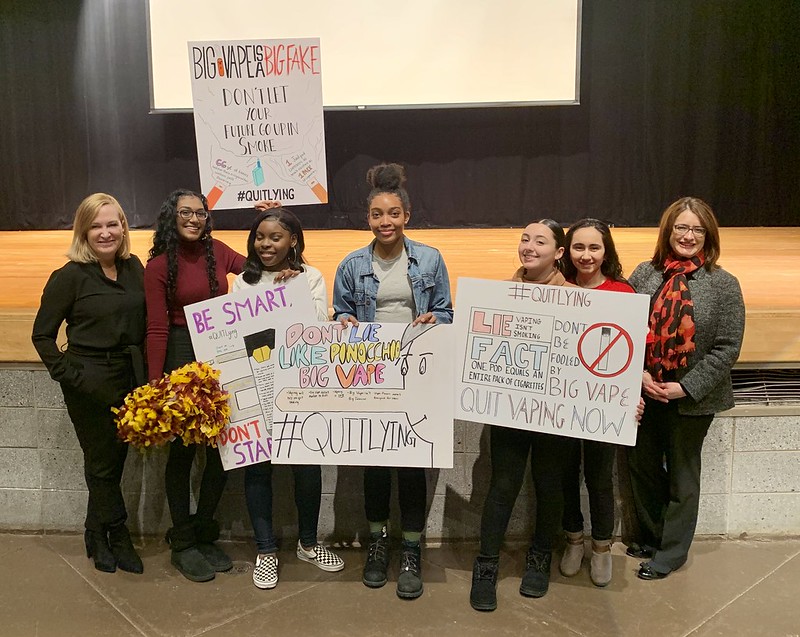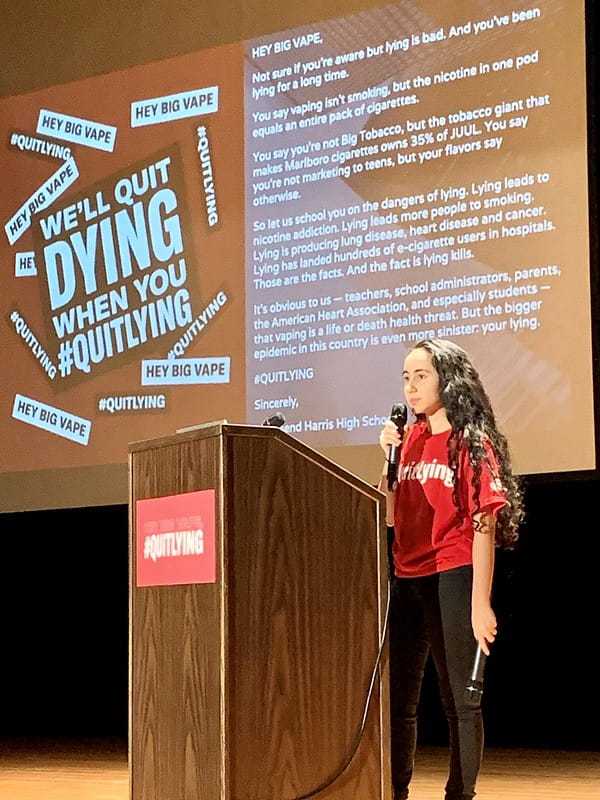Students call out tobacco industry on Quit Lying Day

From coast to coast, schools are turning basketball game halftimes, pep rallies and other school activities into rallies for students’ health as part of the #QuitLying campaign.
Students across the country want to hold the e-cigarette industry accountable for its lies to youth about vaping and nicotine addiction. Events empowering them to speak out against vaping are planned throughout early 2020.
“We are providing outraged students, parents and educators alike with a forum and the tools to seize control of the narrative and call out the tobacco industry… to protect the health and safety of our nation’s kids,” said American Heart Association CEO Nancy Brown. “Together we are demanding that Big Vape #QuitLying.”
At Galileo Academy of Science and Technology High School in San Francisco, students are sharing their experiences with vaping and announcing calls to action. And while the pep band played, students in Flushing, New York, gathered in the Townsend Harris High School auditorium to demand accountability by e-cigarette companies for spending millions to market addictive products directly to youth. Some students made pointed signs directed at “Big Vape.”
After decades of reduced smoking rates, the number of teens who vape has more than doubled in the past two years — to 5 million, according to the 2019 National Youth Tobacco Survey. In New York City, one in six public high school students use e-cigarettes, according to the New York City Department of Health and Mental Hygiene.

At Eastview High School in Apple Valley, Minnesota, freshmen and sophomores participated in two assemblies about the dangers of vaping and signed an open letter asking tobacco companies to come clean about the dangers of e-cigarettes.
Republic High School in Republic, Missouri, shared information on the dangers of vaping through announcements, posters and a peer-to-peer event on Jan. 27.
E-cigarettes have been falsely marketed to youth as a safe alternative to traditional cigarettes, according to the AHA. E-cigarette companies, including market leader JUUL, which is 35% owned by the manufacturer of Marlboro cigarettes, are targeting youth and addicting a new generation to nicotine, reversing decades-long progress in reducing youth tobacco use.
E-cigarettes can contain unusually high levels of nicotine — in fact, one e-cigarette pod can contain at least as much nicotine as an entire pack of cigarettes. Kids and teens who vape are particularly susceptible to nicotine addiction, which rewires the developing brain.
The AHA recently announced a $20 million research initiative to explore how nicotine impacts young people.
“This research project, one of the largest ever funded by the association, will help us answer critical questions about the health consequences of e-cigarette use and nicotine addiction, particularly in youth,” said AHA President Robert A. Harrington, M.D.
Vaping’s effects on the heart, brain, lungs and blood vessels are not well understood, especially among children and adolescents, the association said, pointing to the recent spate of vaping-related lung disease and deaths as tragic proof.
The AHA advocates for e-cigarettes to be part of comprehensive clean indoor air laws, access to evidence-based methods to quit tobacco, and removing tobacco sales in pharmacies and health-related institutions. For more information, visit quitlying.org.






